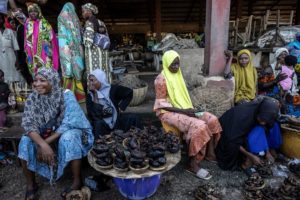Over 40 million folks throughout West and Central Africa are struggling to feed themselves through the 2024 post-harvest season.
A press release launched by the United Nations World Meals Programme on Friday stated the quantity is about to rise to 52.7 million by mid-2025, together with 3.4 million folks dealing with emergency ranges of starvation (IPC/CH Section 4).
Quoting its new Cadre Harmonisé meals safety evaluation launched this month, the world organisation stated regardless of a marginal drop within the variety of acutely meals insecure folks in comparison with final 12 months – linked to improved safety and above, common rainfall in some elements of the Sahel, meals insecurity is worsening.
The variety of folks dealing with emergency ranges of starvation (IPC/CH Section 4) has surged by 70 per cent through the post-harvest season and 22 per cent through the June-August 2025 lean season, the assertion added.
READ ALSO: Companies Venture Naira Depreciation Into Q1 2025 — CBN
Nations most affected embody Nigeria, Cameroon, and Chad, which collectively account for properly over half of the entire food-insecure inhabitants – whereas forcibly displaced folks bear the brunt of the meals disaster.
This case, the UN stated underscores the pressing want for enhanced humanitarian motion and long-term options that successfully deal with the meals disaster engulfing the Sahel and the Lake Chad area.

“The vicious cycle of starvation in West and Central Africa could be damaged, but it surely requires a elementary shift in our strategy,” stated Margot van der Velden, WFP’s Regional Director for Western Africa.
“Meals insecurity within the area is pushed by battle, displacement, financial instability, and extreme local weather shocks. Over 10 million folks have been forcibly displaced within the area, with vital numbers in Burkina Faso, Chad, Cameroon, Mauritania, Niger, and Nigeria.
“Forcibly displaced persons are most frequently minimize off from their fields and grazing areas making farming – very important for meals safety – unimaginable. Moreover, local weather shocks – particularly the lethal floods this 12 months that affected six million folks – declare lives and destroy livelihoods, disrupting agricultural productiveness.
“The persevering with deterioration of meals safety and diet regardless of vital efforts by governments and companions, emphasizes the necessity for an pressing paradigm shift in response,” stated Robert Guei, FAO Sub-regional Coordinator for West Africa.

The organisation known as for well timed, versatile, and predictable funding to achieve crisis-affected folks with lifesaving help, and large investments in preparedness, anticipatory motion and resilience-building to empower communities and cut back humanitarian wants.
“We have to strengthen and implement joint built-in resilience programmes in probably the most affected international locations and past. Moreover, we have to facilitate smallholder farmers’ entry to domestically produced fertilizers to spice up sustainable, inexpensive, and nutritious meals manufacturing.”
It stated excessive meals costs and households’ low buying energy are compounding the disaster, making it unimaginable for a lot of households to afford even primary nutritious meals.

These financial points are significantly extreme in coastal international locations reminiscent of Senegal, Guinea, Sierra Leone, and Nigeria, the place the price of dwelling has skyrocketed.
The state of affairs is considerably affecting the dietary standing of youngsters.
In 2024, an estimated 16.3 million youngsters have been anticipated to undergo from acute malnutrition, together with 5 million in its extreme kind. Latest diet surveys performed within the Sahel additionally reveal a deteriorating state of affairs in a number of areas.
“Good diet within the early years of life is the bedrock of kid survival, growth and future wholesome grownup life. Each greenback invested in diet yields as much as $16 in financial returns by means of improved well being, enhanced schooling outcomes, and elevated productiveness all through life,” stated the UNICEF Regional Director, Gilles Fagninou. “We should guarantee a dependable and adequate provide of therapeutic meals to deal with youngsters beneath 5 within the area, whereas on the similar time, we search to take a position for the long-term to stop malnutrition occurring within the first place.”
With adequate and predictable funding, FAO, UNICEF, and WFP stated they’ll proceed working with nationwide governments, scaling up their ongoing efforts to alleviate starvation, construct resilient communities, transfer in the direction of sustainable meals programs and carry folks out of poverty by means of resilience-building programmes.
The publish Over 40 Million Folks Throughout West, Central Africa Are Struggling To Feed — UN appeared first on Channels Tv.







